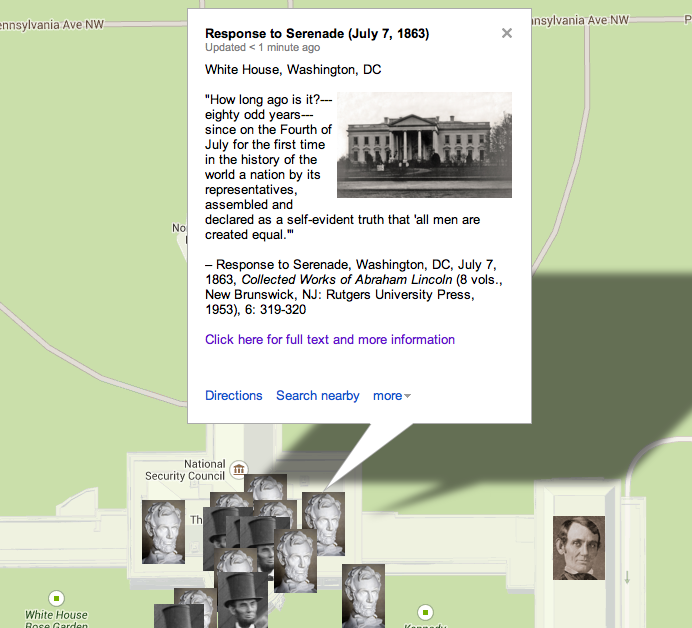Contributing Editors for this page include Emily Weiss
Ranking
#86 on the list of 150 Most Teachable Lincoln Documents
Annotated Transcript
On This Date
Close Readings
Emily Weiss, “Understanding Lincoln” blog post (via Quora), November 16, 2013
Custom Map
How Historians Interpret
“The next night the president was again inside the War Department monitoring the situation along the upper Potomac when at about 8 o’clock a large group of citizens marched over to the White House for a spontaneous celebration of the recent victories. Lincoln hurried to the main portico and briefly addressed the crowd, summoning up as much enthusiasm as he could for the unexpected encounter. He earnestly thanked ‘Almighty God’ for the ‘occasion’ that produced their serenade, and then commented, somewhat incoherently, on the symbolism of Independence Day in American history. ‘How long ago is it? – eighty odd years,’ he asked about the nation’s founding, before detailing other significant events that had occurred on that critical day. He called the story ‘a glorious theme and the occasion for a speech’ but denied that he was prepared to make such an address at that moment.”
— Matthew Pinsker, Lincoln’s Sanctuary (New York: Oxford University Press, 2003), 105.
NOTE TO READERS
This page is under construction and will be developed further by students in the new “Understanding Lincoln” online course sponsored by the House Divided Project at Dickinson College and the Gilder Lehrman Institute of American History. To find out more about the course and to see some of our videotaped class sessions, including virtual field trips to Ford’s Theatre and Gettysburg, please visit our Livestream page at http://new.livestream.com/gilderlehrman/lincoln
Searchable Text
Fellow-citizens: I am very glad indeed to see you to-night, and yet I will not say I thank you for this call, but I do most sincerely thank Almighty God for the occasion on which you have called. [Cheers.] How long ago is it?—eighty odd years—since on the Fourth of July for the first time in the history of the world a nation by its representatives, assembled and declared as a self-evident truth that “all men are created equal.” [Cheers.] That was the birthday of the United States of America. Since then the Fourth of July has had several peculiar recognitions. The two most distinguished men in the framing and support of the Declaration were Thomas Jefferson and John Adams—the one having penned it and the other sustained it the most forcibly in debate—the only two of the fifty-five who sustained [signed?] it being elected President of the United States. Precisely fifty years after they put their hands to the paper it pleased Almighty God to take both from the stage of action. This was indeed an extraordinary and remarkable event in our history. Another President, five years after, was called from this stage of existence on the same day and month of the year; and now, on this last Fourth of July just passed, when we have a gigantic Rebellion, at the bottom of which is an effort to overthrow the principle that all men were [are?] created equal, we have the surrender of a most powerful position and army on that very day, [cheers] and not only so, but in a succession of battles in Pennsylvania, near to us, through three days, so rapidly fought that they might be called one great battle on the 1st, 2d and 3d of the month of July; and on the 4th the cohorts of those who opposed the declaration that all men are created equal, “turned tail” and run. [Long and continued cheers.] Gentlemen, this is a glorious theme, and the occasion for a speech, but I am not prepared to make one worthy of the occasion. I would like to speak in terms of praise due to the many brave officers and soldiers who have fought in the cause of the Union and liberties of the country from the beginning of the war. There are trying occasions, not only in success, but for the want of success. I dislike to mention the name of one single officer lest I might do wrong to those I might forget. Recent events bring up glorious names, and particularly prominent ones, but these I will not mention. Having said this much, I will now take the music.

